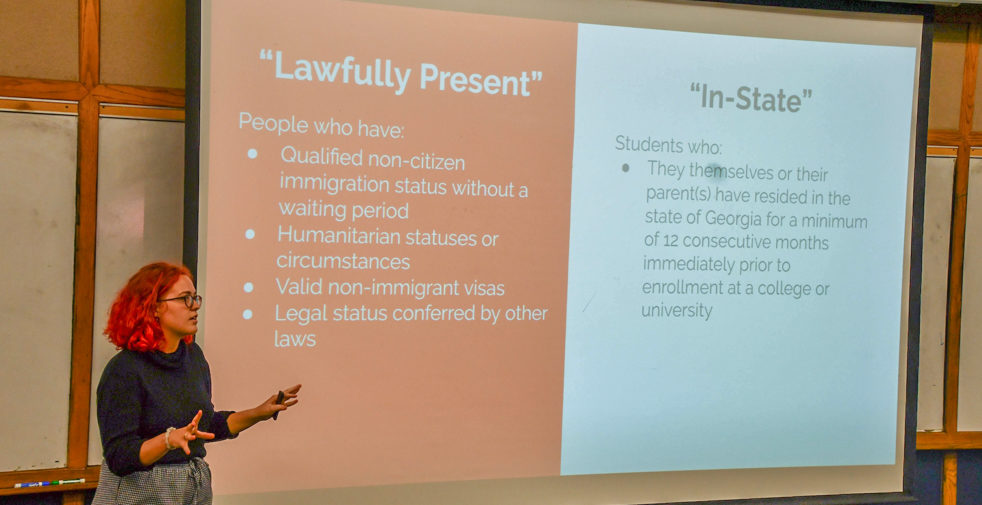E
In the pursuit of advocacy and education of the student body, YDSA hosted a teach-in on the undocumented student ban in place in the state of Georgia. Currently, the University System of Georgia Board of Regents Policy 4.1.6 currently prevents undocumented students from attending GT, UGA, and GCSU. This past week, YDSA members took the time to improve the student body’s understanding of not just the bill but also what it means to be undocumented in America.This past week, YDSA members took the time to expand the student body’s understanding of not just the bill but also what it means to be undocumented in America.
The teach-in consisted of a presentation led by four student speakers, Ruby Hembree, Radha Jagwani, Kate Wehrenberg and Davis Schultz, and periodic breakouts, where audience members were encouraged to speak with one another about provided on-topic questions.
The first student speaker, Ruby Hembree, began by speaking about important terminology when it comes to an understanding of undocumented immigrants and the current ban in place. She went on further to discuss the obstacles that undocumented people in this country face.
Following the discussion of terminology, Radha Jagwani and Kate Wehrenberg delved into the origins of USG BOR Policy 4.1.6 and Policy 4.3.4, which requires universities to “verify the lawful presence in the United States of every successfully admitted person applying for resident tuition status” and the effects they have on the state of Georgia. There was a discussion of the power structure of the State legislature and the demographics of the Board of Regents.
There was also a discussion of the social and economic contribution undocumented immigrants have in the country, along with a rebuttal of arguments in support of the policy. “We’re losing out on them just as much they’re losing out on us,” said Jagwani. “Additionally, the argument that undocumented immigrants will be taking away spots from people who deserve it more somehow by being born here. There were only 27 undocumented students enrolled in the top 5 schools at the time that the ban was instituted.”
After a discussion of the ban itself, the conversation switched to how Tech students could take steps to be active on the matter. An audience member had thoughts on the topic of student engagement in activism.
“If every single student on campus just woke up one day and was like, this is an outrage, I’m just going to not go to class and let’s have solved we probably get solved in like a week, because of just business shutting down,” the student said. “As usual, the struggle is going to be in sort of gradually building up that consciousness until it reaches some sort of breaking point of showing people that they do actually have the power to change.”
Davis Schultz also had insight into making a difference in the issue and the importance organization plays at Tech and at other Georgia schools. “There has been a lot of organization on this [issue] at UGA, and it’s definitely something to emulate in your attempt to get organized,” Schultz said, “It’s all about having organization among the different schools and capitalizing on the fact that we’re a city that has nine major universities with people that are interested in working on this issue”
The event concluded with Q&A, and an open invitation to attend future opportunities for activism, including the SGA Resolution in defense of Undocumented Students on October 22nd. Interviewed students claimed they left with a positive and more informed outlook on the issue. “I just think that undocumented students should have a right to attend Tech,” said Izzy Sadek, third-year BME. “It’s messed up that we don’t allow them to. As a group of students, I think we have the power to change that.”
YDSA intends to use this teach-in as a stepping stone to more activism at Georgia Tech. YDSA Immigration Committee Co-Chair Ariella Ventura, who organized the event, had some parting words on YDSA’s next steps when it comes to the ban. “Tech [students] need to know that this ban exists before we can overturn it. So, by telling as many people about it as possible is the first step. Hopefully, by telling people about the ban, more will feel empowered to work towards overturning it. So, once we have that mass movement, not only at Georgia Tech but also at GCSU and UGA, we can work together as a University System of Georgia because we the students are the university system, they are nothing without us. We will work to overturn the ban, and we will win.”
Editor’s Note: An earlier version of this article stated a student’s full name without the student’s permission. This online version has been updated per the student’s request.
